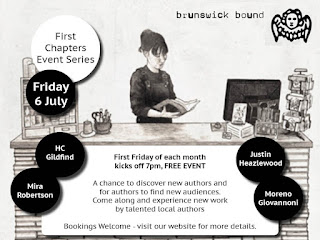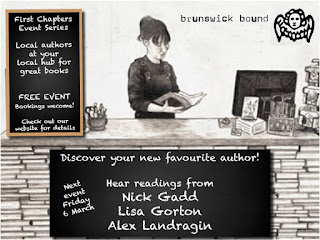First Chapters Q&A with Eleni Hale
Eleni Hale was previously a reporter at the Herald Sun, a communications strategist for the union movement and has written for many print and online news publications. Her short story Fig was published as part of the ABC's In Their Branches project and she has received three Varuna awards.
You can find out more about First Chapters on the Brunswick Bound website or make a booking via Eventbrite.
Eleni will be reading from her YA novel Stone Girl at First Chapters on Friday 6 October.
We asked Eleni some bookish questions to get to know her better and this is what she had to say.
1.Brunswick
We asked Eleni some bookish questions to get to know her better and this is what she had to say.
1.
Chapter
one. The narrator in Stone Girl,
Sophie Soukaris, is 12-years-old. She is at the police station and in shock.
Her mum is dead and Sophie thinks it’s her fault.
Since
there is no one else to care for her, a social worker comes to take her to a
group home where kids without a family live. This is the beginning of a very
new life for Sophie.
The
book follows her journey all the way to 18-years-old and shows her complete
transformation from innocent into the type of teenager society loves to hate.
The
section you will hear takes you inside the mind of a child entering a system
fraught with inconsistencies. She will soon need to learn to rely on herself.
But here, she still believes someone else can save her.
2. How would you describe the kinds of
books that you write?
I
like to draw the reader into the mindset of someone they might not have
previously thought they could (or would want) to relate to. This can be
confronting but also interesting. And isn’t that what books are all about? We
get to live many different worlds and then put down the book and return to our
own but with a greater understanding of those around us.
3. What was the first book that you read
(or had read to you) that left an impression on you?
Besides
my childhood obsession with the Grimm’sFairy Tales, Go Ask Alice was a
book I read as a child of about 12 which I never forgot. It taught me about
drugs and choices and that the world was not particularly safe. I also learnt
about peer pressure.
Yes.
Is there a better way?
Who
are we? What do we want? Should we allow euthanasia or show kindness to
convicted criminals or believe in God?
In
books we get to do something that isn’t always possible; we explore a subject deeply
from an another perspective. As if we were them. No other medium offers this
level of exposure. Movies, art and music give us a glimpse but in books you get
to go inside the minds of others. What does the world they live in and the
choices they make actually feel like in their skin?
For
this reason I don’t agree with those who say we should protect teens from dark
gritty subject matter. They are already exposed to so much in everyday life. At
least with books they get to figure out what it all really means and walk away
wiser.
5. What’s your go-to solution for writer’s
block?
For me writer's block is a stop sign with a purpose. it indicates the scene is unclear and my subconscious isn't coming to the rescue with last minute inspiration.
So when my fingers are suspended over the keyboard and mind blank I know it's time to go for a walk, think, listen to music... work it out. Not get frustrated and try to write.
For me writer's block is a stop sign with a purpose. it indicates the scene is unclear and my subconscious isn't coming to the rescue with last minute inspiration.
So when my fingers are suspended over the keyboard and mind blank I know it's time to go for a walk, think, listen to music... work it out. Not get frustrated and try to write.
6.
Which words or phrases do you overuse?
All
the usual suspects: ‘and’, ‘very’, ‘just’, ‘really’. It’s embarrassing when I
do a search of my document and I realise the quantity of unneeded words that
have survived multiple edits.
7. What do you put down as your occupation
when asked?
I
used to write ‘reporter’ but now I’m thrilled to say ‘author.’ I have very
young kids and only work part-time other than writing so for now I think this
is the correct occupational label. Yay!
8. What is the question that you hope never
to be asked in an author Q&A?
My
book has a personal element because it’s inspired by real life. One of the
reason I wrote it as a fictional novel was to protect my family so I hope not
to be asked about them. That said, I’m happy to discuss the group and foster
homes I grew up in as a teen which makes up the heart of the story.
Also,
I’m nearly finished the first draft of the second book however I still can’t
talk about it in a succinct way. All I’ll say is it’s similar to Stone Girl in its gritty content.
9. What question do you hope you will be
asked and why?
‘Why
write a book like Stone Girl?’ I thought about this question a lot because I
knew it would be a difficult book in many ways. However, I came to the
conclusion that it had to be written before I could move on.
10. Which book that you have read do you
think should be better known or more widely read?
Most
of my favourite books are well known.
Wake in Fright by Kenneth Cook
The story of Christiane F.
The
only one I can think of that may not be widely known is Still Waters by Camilla Noli – a frightening and unforgettable
read.
You can find out more about First Chapters on the Brunswick Bound website or make a booking via Eventbrite.





Comments
Post a Comment